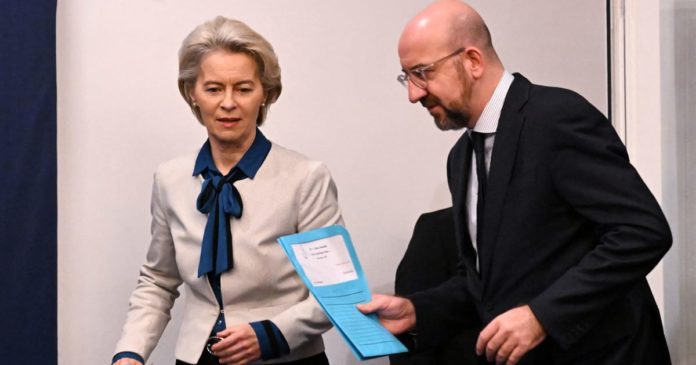European Council chief Charles Michel warned Chinese leader Xi Jinping on Thursday to immediately deal with “a list of companies” involved in supplying Russia with dual-use goods, indicating that EU countries will soon discuss whether to sanction these entities.
Some 13 companies based in China are in the EU’s sights as the bloc seeks to tighten up on leakages of dual-use goods being exported to Russia, which Kyiv and its Western allies say are enabling the war of aggression against Ukraine. Absent adequate assurances from Beijing, EU leaders meeting in Brussels next week may decide to name and shame the companies.
“We have identified a list of companies which are suspected to play a role in circumventing our sanctions, and with the occasion … during the summit, we agree that it’s important to go more into the details,” Michel told reporters after summit talks with Xi in Beijing. “We sincerely hope that today we are heard, and then the appropriate action will be undertaken by China.”
“We will also … debrief our member state because the member states will have to decide what further action to be done,” Michel added.
European Commission President Ursula von der Leyen, who is responsible for drawing up the upcoming package of sanctions, said she told Xi “to prevent any attempts by Russia to undermine the impact of sanctions.”
The Chinese readout by state media Xinhua didn’t say how Xi responded to those concerns, though he did say the two sides should “increase understanding and properly handle differences through constructive dialogue.”
The EU-China summit, the first to take place in person in four years, comes as Beijing’s leadership is stepping up diplomatic engagement amid an economic downturn, driven in part by growing geopolitical tension and the West’s call for de-risking from the world’s second-largest economy.
Xi, in his meeting with the EU pair, indirectly brushed aside the need for de-risking, and instead billed China as a partner for Europe’s trade and tech sectors — as the U.S. widens its curbs on technology exports to its biggest competitor.
Beijing, Xi said, “is willing to treat the EU as a key partner in economic and trade cooperation, a priority partner in tech cooperation, and a trusted partner in industrial and value chains.”
A subsequent session with Premier Li Qiang saw more tough rhetoric against the EU’s increasingly assertive agenda toward China.
“China is opposed to violations of the basic principles of market economy, [and to] the politicization and securitization of economic and trade issues,” Li said, adding that Beijing “hopes that Europe would be cautious in rolling out restrictive trade policies and using trade remedies.”
Von der Leyen, asked about the EU’s probe into state subsidies behind made-in-China electric vehicles, would only say the issue came up during the summit.
On the question of the EU’s trade deficit against China — which has doubled to nearly €400 billion between 2020 and 2022 — von der Leyen described the situation as “critically imbalanced.” There were “intense” discussions with Xi, she said, and “we agreed that we have now a list of different elements where we want to deep dive in together in the high level dialogue.”
“And this, of course, will determine the future of our relationship … And therefore, I think it’s important to see now the progress on the ground,” she said.
Von der Leyen added that she expected to see the results of China taking concrete steps to resolve the issue of cross-border data flows, the lack of market access for medical devices, and the restrictive laws against the cosmetics industry, a big concern for France.


